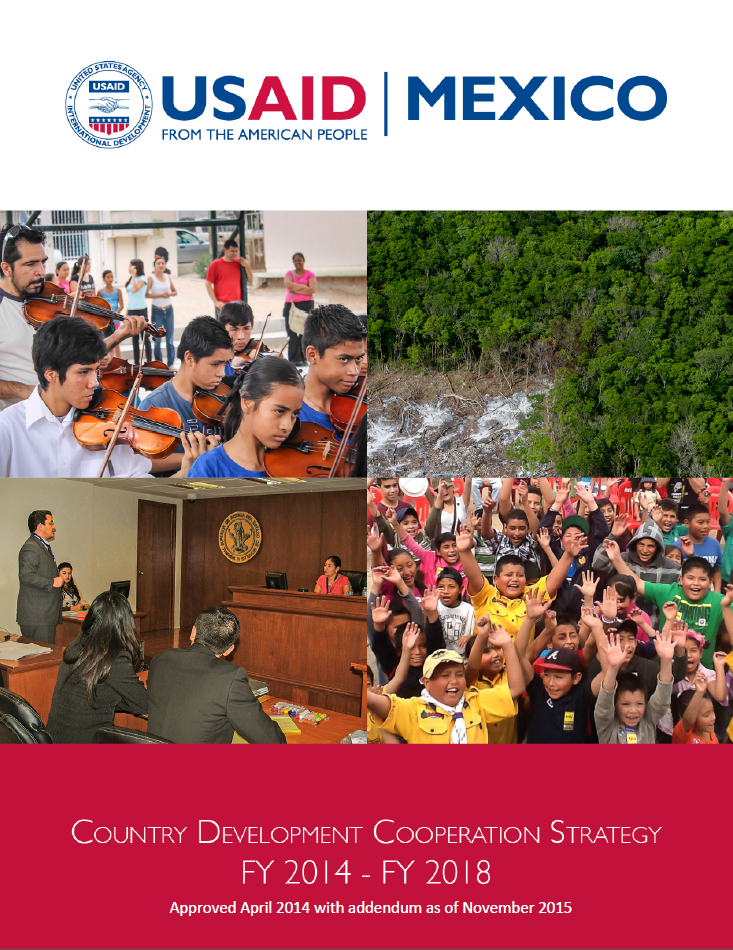Addendum to CDCS (November 2015)
On November 13, 2015, USAID/Mexico’s Mission Director approved an addendum to the Country Development Cooperation Strategy (CDCS) FY 2014‐FY 2018, which was originally approved in April 2014. The addendum is a change under Development Objective 3 (DO 3), which now explicitly includes accountability and transparency as an additional Intermediate Result (IR) (IR 3.3 Government of Mexico (GOM) accountability and transparency strengthened). Pages 1‐11, include an updated DO 3 narrative; updated monitoring, evaluation and learning section for DO 3; and an updated CDCS results framework.
Executive Summary
The strong social, cultural and economic ties, common security concerns, and the shared border between Mexico and the U.S., combined with Mexico’s status as an upper middle income country with a high level of institutional capacity, provide a unique rationale for the USAID/Mexico program. Reflecting this expansive relationship, there are no less than 50 formal bilateral policy and/or working level coordination mechanisms between the U.S. and Mexican Governments, covering such issues as environment, security, trade, defense, border management, telecommunications, human rights, emergency management, health, electricity, agriculture, transportation, and water management. In this context, USAID’s programs support Mexican efforts to address key challenges to improve citizen security, justice, and environmental sustainability with program approaches specifically tailored to the unique U.S.‐Mexico relationship.
USAID’s Country Development Cooperation Strategy (CDCS) will contribute to the achievement of the U.S. Embassy in Mexico’s objectives, in particular in the economic and security spheres. Specifically, USAID’s focus relates to two high‐level priorities of both the U.S. and Mexican Governments: 1) strengthening security under the Merida Initiative;1 and 2) mitigating the effects of Global Climate Change (GCC) as part of a Presidential Initiative.2 USAID programs for FY 2014‐2018 will pursue the following four objectives:
- Crime and violence prevention models replicated by local stakeholders;
- Constitutional criminal justice reforms of 2008 are operational;
- Enabling environment to protect human rights and prevent abuses improved; and
- Greenhouse gas emissions reduced in targeted key sectors.
Several guiding principles underlie USAID’s plans for the Strategy period. First, by catalyzing, leveraging, and complementing public‐ and private‐sector resources and capabilities, USAID seeks to achieve a lasting impact beyond its investments. Second, to ensure that there is substantial local ownership of USAID‐financed initiatives, USAID will support local champions and advocates of Mexican solutions to the country’s challenges. Third, USAID will utilize its relatively limited resources in Mexico to identify, develop, and assess demonstration models with the end goal of promoting the replication of proven approaches and models by Mexican entities and funding sources. Fourth, USAID will collaborate closely with a broad range of Government of Mexico (GOM) and USG interagency actors to maximize the impact of its programs on bilateral policy‐level priorities and to coordinate related activities.
Through the strategic allocation of limited resources and the development and expansion of public-private partnerships, USAID programs will support specific goals laid out in Mexico’s 2013‐2018 National Development Plan. Likewise, USAID’s partnership with the GOM will help enhance Mexico’s emerging role in the international community and strengthen USG‐GOM collaboration on international development themes.








Comment
Make a general inquiry or suggest an improvement.